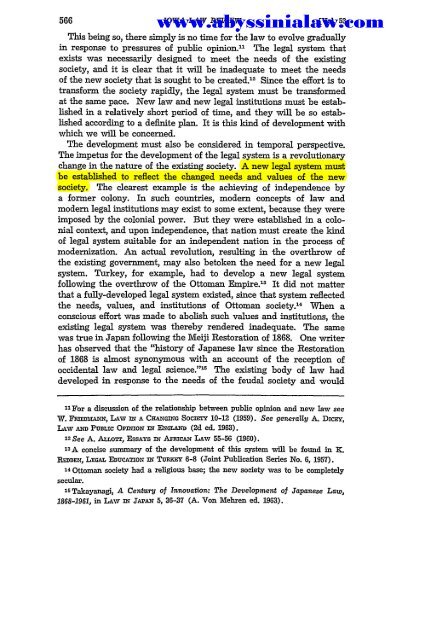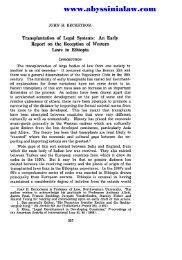Create successful ePaper yourself
Turn your PDF publications into a flip-book with our unique Google optimized e-Paper software.
IOWA LAW REVIEW<br />
[Vol 53<br />
www.abyssinialaw.com<br />
This being so, there simply is no time for the law to evolve gradually<br />
in response to pressures of public opinion." 1 The legal system that<br />
exists was necessarily designed to meet the needs of the existing<br />
society, and it is clear that it will be inadequate to meet the needs<br />
of the new society that is sought to be created., 2 Since the effort is to<br />
transform the society rapidly, the legal system must be transformed<br />
at the same pace. New law and new legal institutions must be established<br />
in a relatively short period of time, and they will be so established<br />
according to a definite plan. It is this kind of development with<br />
which we will be concerned.<br />
The development must also be considered in temporal perspective.<br />
The impetus for the development of the legal system is a revolutionary<br />
change in the nature of the existing society. A new legal system must<br />
be established to reflect the changed needs and values of the new<br />
society. The clearest example is the achieving of independence by<br />
a former colony. In such countries, modern concepts of law and<br />
modern legal institutions may exist to some extent, because they were<br />
imposed by the colonial power. But they were established in a colonial<br />
context, and upon independence, that nation must create the kind<br />
of legal system suitable for an independent nation in the process of<br />
modernization. An actual revolution, resulting in the overthrow of<br />
the existing government, may also betoken the need for a new legal<br />
system. Turkey, for example, had to develop a new legal system<br />
following the overthrow of the Ottoman Empire. 3 It did not matter<br />
that a fully-developed legal system existed, since that system reflected<br />
the needs, values, and institutions of Ottoman society.' 4 When a<br />
conscious effort was made to abolish such values and institutions, the<br />
existing legal system was thereby rendered inadequate. The same<br />
was true in Japan following the Meiji Restoration of 1868. One writer<br />
has observed that the "history of Japanese law since the Restoration<br />
of 1868 is almost synonymous with an account of the reception of<br />
occidental law and legal science."' 5 The existing body of law had<br />
developed in response to the needs of the feudal society and would<br />
"For a discussion of the relationship between public opinion and new law see<br />
W. Rm -NxN, LAw IN A CHANGING SocIY 10-12 (1959). See generally A. DiC=r,<br />
LAw Am PuBLic Opxniou IN ENGLAND (2d ed. 1963).<br />
12 See A. ALLOw, EssAYs In Arncm LAw 55-56 (1960).<br />
13A concise summary of the development of this system will be found in .<br />
REDDEN, LEGAL EDucATiO x I TuRKEY 6-8 (Joint Publication Series No. 6, 1957).<br />
14 Ottoman society had a religious base; the new society was to be completely<br />
secular.<br />
25 Takayanagi, A Century of Innovation: The Development of Japanese <strong>Law</strong>,<br />
1868-1961, in LAW IN JAPAN 5, 36-37 (A. Von Mehren ed. 1963).





